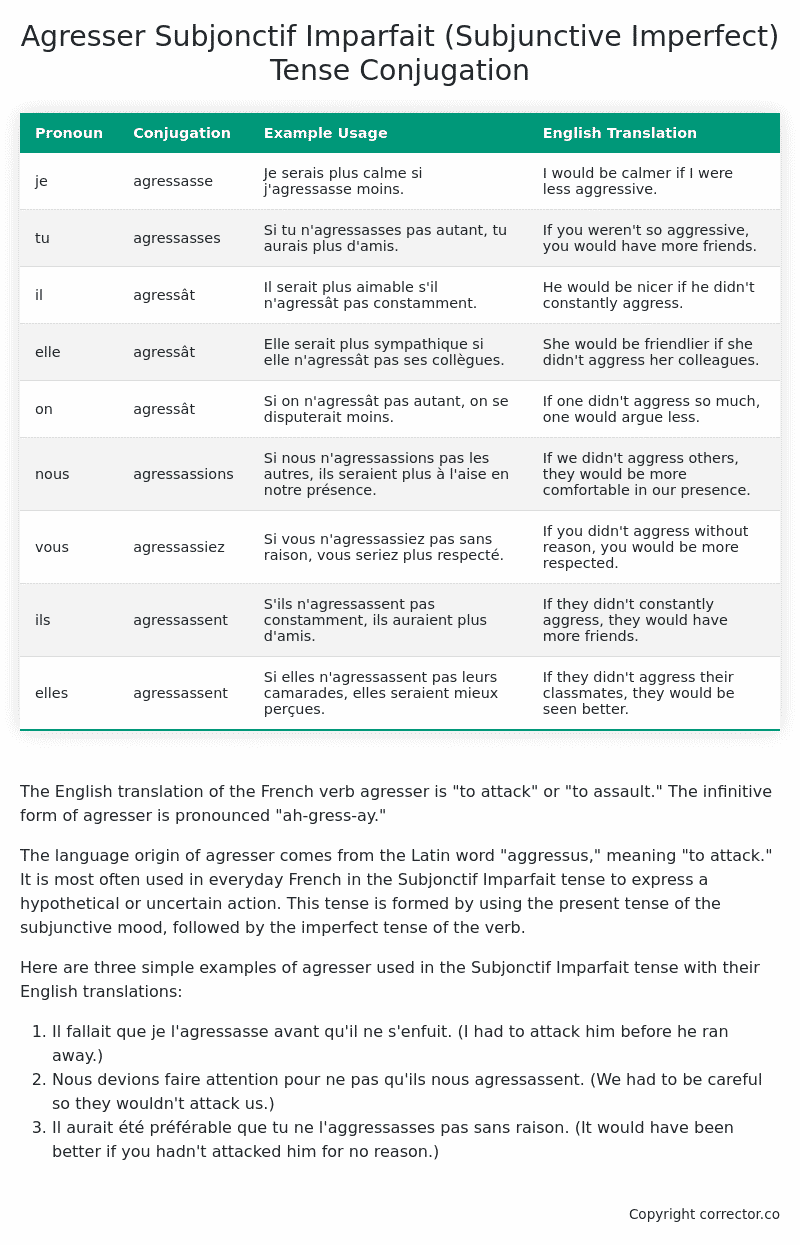Subjonctif Imparfait (Subjunctive Imperfect) Tense Conjugation of the French Verb agresser
Introduction to the verb agresser
The English translation of the French verb agresser is “to attack” or “to assault.” The infinitive form of agresser is pronounced “ah-gress-ay.”
The language origin of agresser comes from the Latin word “aggressus,” meaning “to attack.” It is most often used in everyday French in the Subjonctif Imparfait tense to express a hypothetical or uncertain action. This tense is formed by using the present tense of the subjunctive mood, followed by the imperfect tense of the verb.
Here are three simple examples of agresser used in the Subjonctif Imparfait tense with their English translations:
- Il fallait que je l’agressasse avant qu’il ne s’enfuit. (I had to attack him before he ran away.)
- Nous devions faire attention pour ne pas qu’ils nous agressassent. (We had to be careful so they wouldn’t attack us.)
- Il aurait été préférable que tu ne l’aggressasses pas sans raison. (It would have been better if you hadn’t attacked him for no reason.)
Table of the Subjonctif Imparfait (Subjunctive Imperfect) Tense Conjugation of agresser
| Pronoun | Conjugation | Example Usage | English Translation |
|---|---|---|---|
| je | agressasse | Je serais plus calme si j’agressasse moins. | I would be calmer if I were less aggressive. |
| tu | agressasses | Si tu n’agressasses pas autant, tu aurais plus d’amis. | If you weren’t so aggressive, you would have more friends. |
| il | agressât | Il serait plus aimable s’il n’agressât pas constamment. | He would be nicer if he didn’t constantly aggress. |
| elle | agressât | Elle serait plus sympathique si elle n’agressât pas ses collègues. | She would be friendlier if she didn’t aggress her colleagues. |
| on | agressât | Si on n’agressât pas autant, on se disputerait moins. | If one didn’t aggress so much, one would argue less. |
| nous | agressassions | Si nous n’agressassions pas les autres, ils seraient plus à l’aise en notre présence. | If we didn’t aggress others, they would be more comfortable in our presence. |
| vous | agressassiez | Si vous n’agressassiez pas sans raison, vous seriez plus respecté. | If you didn’t aggress without reason, you would be more respected. |
| ils | agressassent | S’ils n’agressassent pas constamment, ils auraient plus d’amis. | If they didn’t constantly aggress, they would have more friends. |
| elles | agressassent | Si elles n’agressassent pas leurs camarades, elles seraient mieux perçues. | If they didn’t aggress their classmates, they would be seen better. |
Other Conjugations for Agresser.
Le Present (Present Tense) Conjugation of the French Verb agresser
Imparfait (Imperfect) Tense Conjugation of the French Verb agresser
Passé Simple (Simple Past) Tense Conjugation of the French Verb agresser
Passé Composé (Present Perfect) Tense Conjugation of the French Verb agresser
Futur Simple (Simple Future) Tense Conjugation of the French Verb agresser
Futur Proche (Near Future) Tense Conjugation of the French Verb agresser
Plus-que-parfait (Pluperfect) Tense Conjugation of the French Verb agresser
Passé Antérieur (Past Anterior) Tense Conjugation of the French Verb agresser
Futur Antérieur (Future Anterior) Tense Conjugation of the French Verb agresser
Subjonctif Présent (Subjunctive Present) Tense Conjugation of the French Verb agresser
Subjonctif Passé (Subjunctive Past) Tense Conjugation of the French Verb agresser
Subjonctif Imparfait (Subjunctive Imperfect) Tense Conjugation of the French Verb agresser (this article)
Subjonctif Plus-que-parfait (Subjunctive Pluperfect) Tense Conjugation of the French Verb agresser
Conditionnel Présent (Conditional Present) Tense Conjugation of the French Verb agresser
Conditionnel Passé (Conditional Past) Tense Conjugation of the French Verb agresser
L’impératif Présent (Imperative Present) Tense Conjugation of the French Verb agresser
L’infinitif Présent (Infinitive Present) Tense Conjugation of the French Verb agresser
Struggling with French verbs or the language in general? Why not use our free French Grammar Checker – no registration required!
Get a FREE Download Study Sheet of this Conjugation 🔥
Simply right click the image below, click “save image” and get your free reference for the agresser Subjonctif Imparfait tense conjugation!

Agresser – About the French Subjonctif Imparfait (Subjunctive Imperfect) Tense
Formation
Common Everyday Usage Patterns
Interactions with Other Tenses
Subjonctif Présent
Indicatif Passé Composé
Conditional
Conditional Perfect
Summary
I hope you enjoyed this article on the verb agresser. Still in a learning mood? Check out another TOTALLY random French verb conjugation!


